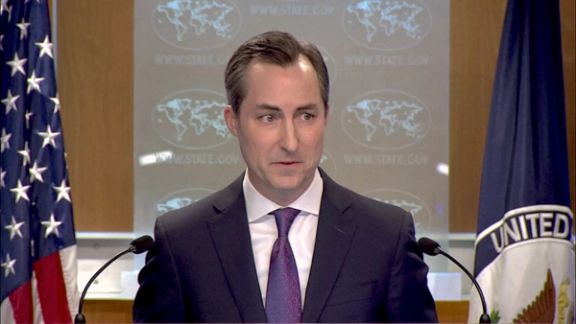US Says Oman Will Be Conduit In Iraqi Debt Payments To Iran

Oman will be the third country that will hold part of the funds Iraq owes Iran, which should be used for non-sanctionable goods, the US State Department said Monday.

Oman will be the third country that will hold part of the funds Iraq owes Iran, which should be used for non-sanctionable goods, the US State Department said Monday.
Last month, the United States issued a sanctions’ waiver allowing Baghdad to pay over $2.7 billion of the $11 billion it owes Tehran for importing electricity and natural gas. Last week, Washington announced a change in the method of disbursing the funds, by transferring the money to third-country banks and then allowing purchases of goods such as food and medicine.
State Department spokesperson Matt Miller in his Monday briefing announced that the third country selected for the new payment method is Oman. “As we’ve said for some time, we thought it was important to get this money out of Iraq, because it is a source of leverage that Iran uses against its neighbor,” he said, without elaborating.
Late last year, the Biden administration started to tighten controls over dollar transactions by Iraqi banks, seeing evidence that there were banking violations potentially enabling Iran to illegally acquire US dollars. In February this year news emerged that Washington further tightened regulations over dollar transfers to and from Iraqi banks.
The leverage the US has in this matter is that Iraqi oil export proceeds are cleared by its banking system. Iraqi requests for cash dollar shipments and banking transfers are scrutinized by US federal agencies to make sure that illicit activities are prevented.
Since the Trump administration exited the 2015 JCPOA nuclear deal and imposed banking sanctions on Iran, it has periodically issued waivers allowing Iraq to make funds available to Iran for purchase of non-sanctionable goods, but to control all the transactions and Iranian attempts to syphon money out of Iraq has been hard.
Whether shifting the funds to Oman will ensure a tighter control over the process is yet to be seen. Clearly, Iran’s attempts to pressure all parties involved in slackening controls will continue. It is not clear if the change is not the result of an Iranian plan to gradually weaken the impact of US banking sanctions on its dealings with Iraq. Iran’s next move could be to further pressure Iraq to ask the United States to lift restrictions on how the funds are disbursed, enabling Tehran to withdraw cash dollars. The current Iraqi government has closer ties with Tehran than its predecessor.
State Department’s Miller, however, insisted that all funds “will still be subject to the same restrictions as when the money was held in accounts in Iraq, meaning that the money can only be used for non-sanctionable activities such as humanitarian assistance, and that all the transactions need to be approved by the United States Treasury Department in advance.”
There have also been multiple media reports that Washington and Tehran have been negotiating over the release of four American held hostage in Iran in exchange for $7 billion frozen by South Korean banks due to US sanctions. The decision to shift Iraqi funds to Oman could also be related to these secret talks.
Miller was asked Monday about the prisoners, but he refused to provide details.
“It’s obviously a very sensitive matter with respect to these detainees,” he said.
But critics who are suspicious of the Biden administration’s secret dealings with Tehran are wary of attempts to give financial rewards to the Islamic Republic in return for the hostages or a limited nuclear understanding, that has been reported by the media.